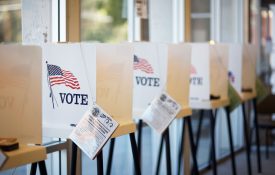-

Some Cognitive Skills Are Easier to Train Later
Older adolescents and adults can learn certain thinking skills, including non-verbal reasoning, more effectively than younger people.
-

Individuals’ Well-Being Linked With When and How They Manage Emotions
Using reappraisal to regulate our emotions in situations we actually have control over may be associated with lower well-being, researchers find.
-

Using Science to Understand How Ballot Design Impacts Voter Behavior
Concern over the security of the voting process is a recurring issue, but psychological science suggests an even bigger problem may lurk within our voting systems: poor design.
-

Thinking of Loved Ones Lessens Our Need to “Reconnect” Through Anthropomorphism
Reminding people of their close relationships can reduce their tendency to anthropomorphize objects as a way of feeling socially connected.
-
New Research From Psychological Science
Read about the latest research published in Psychological Science: An Embodied Account of Early Executive-Function Development: Prospective Motor Control in Infancy Is Related to Inhibition and Working Memory Janna M. Gottwald, Sheila Achermann, Carin Marciszko, Marcus Lindskog, and Gustaf Gredebäck The authors propose an embodied perspective to early executive-functioning development, suggesting that executive-functioning skills are grounded in infant's ability to control and plan motor actions.
-

Effect of Facial Expression on Emotional State Not Replicated in Multilab Study
A coordinated replication effort conducted across 17 labs found no evidence that surreptitiously inducing people to smile or frown affects their emotional state. The findings of the replication project are published as part of a

